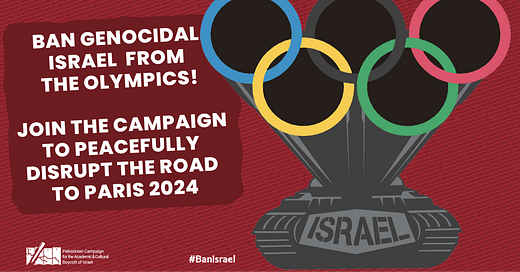Iran Found to Be Amplifying Call to Ban Israel from Paris 2024 Olympics
Potentially indicating Iran’s intent to disrupt the International Olympic Committee's three-day meeting
Welcome to Detect, Decipher, Defend with PeakMetrics—your go-to resource for navigating brand reputation challenges. Explore recent case studies and learn how to detect, decipher, and defend against emerging narrative threats to win the week. Let’s dive in!
Iran is amplifying a growing online narrative calling to ban Israel from the Paris 2024 Olympic Games, according to PeakMetrics’ narrative intelligence. The skyrocketing increase in mentions of this narrative — driven by bot-like activity and coupled with Iran’s intentionally misleading amplification of the narrative — may indicate Iran’s intent to help disrupt or sow discord around the International Olympic Committee’s three-day meeting beginning June 12.
Our “Detect. Decipher. Defend.” Framework
Detect:
Threats to this year’s Olympics have been more widely covered by Russian actors than by Iran. However, as Iran’s proxy conflict with Israel shifts closer to direct confrontation amid the Gaza conflict, Iran may step up its narrative, cyber, and espionage efforts in Europe in an attempt to disrupt this summer’s Olympic games.
Complementing Microsoft’s recent report on Russian malign influence efforts to disrupt the Olympics, PeakMetrics’s narrative intelligence platform detected indicators that Iran is also amplifying online campaigns to denigrate the Paris 2024 Olympic Games. Specifically, Iranian state media recently amplified the narrative, calling to ban Israel from this summer’s games, just after the narrative exploded on social media over the past two weeks. PeakMetrics also detected bot-like activity behind the increase in this narrative.
Decipher:
This online narrative, calling to exclude Israel from the games or to boycott Israel’s participation, gained increasing traction on social media in recent months. Using PeakMetric’s narrative intelligence platform, we charted the evolution of this narrative, including Iran’s amplification and the bot-like activity driving up mentions on social media.
Timeline:
February 20th, 2024: Boycott, divest, sanctions (BDS) movement, which advocates for economic actions to pressure Israel’s policies on Palestine, launches #BanIsrael campaign.
April 30th, 2024: AP reports 300 pro-Palestinian protesters demonstrated near the Paris Olympics organizers’ headquarters, calling to limit Israel’s participation in the games, citing the example of forcing Russian athletes to compete under a neutral flag. Demonstrators use signs with graphics from the BDS campaign.
May 30th, 2024: Israel’s intelligence service alleges Iran was behind recent attacks on Israeli embassies in Europe, including two incidents in May. The headline of a Jerusalem Post article specifically calls out the threat to the Olympics in the context of these allegations of Iranian terror activity.
June 9th, 2024: Mehr News Agency, a semi-official news agency of the Iranian government, publishes an English-language article on an anti-Israel protest outside Olympic headquarters in Paris on June 7th. The article and video are intentionally misleading in their presentation of the context around the protest, including its size. By publishing this article in English, Iranian media may intend to boost support among English-speaking audiences for the banning Israel from the Olympics.
Iranian Media Misrepresents Size of Protest: The thumbnail image in the Iranian news agency’s video does not actually show the June 7th #BanIsrael protest at the Olympic headquarters in Paris. The image was originally published by Turkey’s Anadolu Agency in October 2023 and shows the first pro-Palestinian rally allowed by police in Paris — which drew 15,000 demonstrators. In the video of the June 7th protest, the thumbnail image of mass crowds quickly cuts to closely cropped footage, in an attempt to inflate the crowd size.
Iranian Media Targets English Speakers: Mehr News Agency published this article on June 9th, though the protest occurred two days earlier. This latest protest was not as widely reported in English-language media compared to the April 30th protest. Notably, the specific cut of video footage shared by the Iranian news agency closely matched a video of the protest posted by several Arabic-language YouTube channels and Instagram accounts, including several that several that portray Hamas-related imagery and narratives.
Low Follower Accounts Boost Narrative on Social Media
PeakMetrics examined detected indicators of bot-like activity in the 50,000+ mentions of the #BanIsrael narrative on social media over the past three months. 25% of these posts were from accounts with less than 100 followers.
Bot accounts tend to have lower follower counts compared to authentic accounts. The share of posts from accounts with more than 5,000 followers, typical of larger official or media accounts, was relatively small — just 5%. This discrepancy may explain why this narrative is far less present in the news compared to social media.
The coordinated inauthentic behavior amplifying online calls to ban Israel from the Olympics raises the likelihood that a state actor, such as Iran, may be involved in boosting this narrative.
Defend:
Increasing momentum of the #BanIsrael Olympics movement on social media, likely amplified by bots, points to an elevated risk of online and offline protest activity, targeting the Paris Olympics headquarters and International Olympic Committee, escalating in the coming days around the Executive Board’s meeting.
While reporting on state-backed threats to Paris 2024 has largely focused on Russia, Iran’s amplification of the #BanIsrael Olympics narrative and the significant bot-like activity detected in overall mentions of this narrative, may signal increasing Iranian efforts to disrupt and denigrate this summer’s games.





